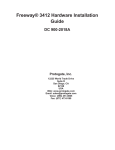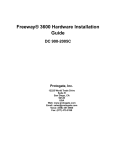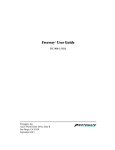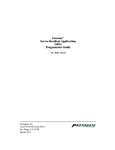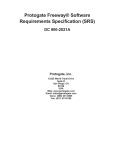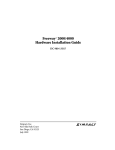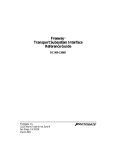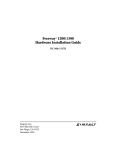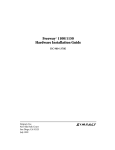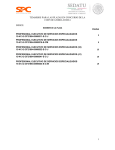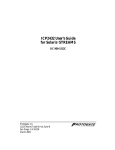Download Protogate Freeway 3112 User`s guide
Transcript
Protogate Freeway® Security Features User’s Guide (SFUG) DC 908-3004A Protogate, Inc. 12225 World Trade Drive Suite R San Diego, CA 92128 USA Web: www.protogate.com Email: [email protected] Voice: (858) 451-0865 Fax: (877) 473-0190 Protogate Freeway® Security Features User’s Guide (SFUG): DC 908-3004A by Protogate, Inc. Published October 2013 Copyright © 2013 Protogate, Inc. This Freeway® Security Features User’s Guide (SFUG) document describes the components of the Protogate Freeway software which can be used to enhance security. The contents of this document are considered to be sensitive, and dissemination of this document should be restricted; only those who are interested in improving the security level of Protogate Freeway systems should read this document. This document can change without notice. Protogate, Inc. accepts no liability for any errors this document might contain. Freeway is a registered trademark of Protogate, Inc. All other trademarks and trade names are the properties of their respective holders. Table of Contents Preface............................................................................................................................................................................v Purpose of Document ............................................................................................................................................v Intended Audience.................................................................................................................................................v Organization of Document ....................................................................................................................................v Protogate References............................................................................................................................................vi Document Conventions ..................................................................................................................................... viii Revision History................................................................................................................................................ viii Customer Support.................................................................................................................................................ix 1. Scope.........................................................................................................................................................................10 1.1. Identification.................................................................................................................................................10 1.2. System Overview..........................................................................................................................................10 1.3. Document Overview.....................................................................................................................................10 2. Reference Documents .............................................................................................................................................11 3. Logs ..........................................................................................................................................................................12 3.1. Configuring Logging ....................................................................................................................................12 3.2. Maintaining Logs .........................................................................................................................................12 4. Firewall ....................................................................................................................................................................14 4.1. Configuring the Firewall ..............................................................................................................................14 5. Auditing....................................................................................................................................................................15 5.1. Configuring Auditing ...................................................................................................................................15 5.2. Maintaining Audit Trail Logs.......................................................................................................................16 6. Hardening a Freeway .............................................................................................................................................18 6.1. Freeway Firewall Settings ............................................................................................................................18 6.2. Unnecessary Services...................................................................................................................................19 6.3. Disallow Direct Root Login .........................................................................................................................19 6.4. NTP (Network Time Protocol).....................................................................................................................20 6.5. SNMP (Simple Network Management Protocol).........................................................................................20 6.6. Secure the Webserver ...................................................................................................................................21 6.7. Enable Logging ............................................................................................................................................22 6.8. Rotate Log Files ...........................................................................................................................................22 6.9. Configure Auditing.......................................................................................................................................24 7. Notes.........................................................................................................................................................................27 A. Sample rc.startsra File...........................................................................................................................................28 A.1. rc.startsra Configuration File...............................................................................................................28 Index.............................................................................................................................................................................37 Colophon......................................................................................................................................................................39 iii List of Tables 1. Revision History ..................................................................................................................................................... viii 2-1. Referenced Documents..........................................................................................................................................11 7-1. Acronym definitions ..............................................................................................................................................27 iv Preface Purpose of Document This Freeway® Security Features User’s Guide (SFUG) document identifies the capabilities of a Freeway which can be used to enhance security. Intended Audience The contents of this document are considered to be sensitive, and dissemination of this document should be restricted; only those who are interested in improving the security level of Protogate Freeway systems should read this document. This document is intended for system administrators who want a better understanding of how to configure a Protogate Freeway to be more secure. Organization of Document This document is organized into the following major sections: Chapter 1 is an overview of this document and of the Protogate Freeway software. Chapter 2 is a list of other documents referenced by this document. Chapter 3 describes the Freeway logging capabilities. Chapter 4 describes the Freeway firewall capabilities. Chapter 5 describes how to setup and use auditing on the Freeway. Chapter 6 describes how to tighten the security on ("harden") a Freeway. Chapter 7 includes general information to aid in understanding this document. v Preface Protogate Freeway Security Features User’s Guide (SFUG) Appendix A includes a sample rc.startsra file, to show how to configure and enable many of the security features described in this document. Protogate References The following general product documentation list is provided to familiarize you with the available Protogate Freeway and embedded ICP products. Most of these documents are available on-line at Protogate’s website (http://www.protogate.com/). Additional information about documents which are specifically referenced by this Freeway Security Features User’s Guide (SFUG) document are in Chapter 2 of this document. General Product Overview Documents Freeway 1100 Technical Overview 25-000-0419 Freeway 2000/4000/8800 Technical Overview ICP2432 Technical Overview 25-000-0374 25-000-0420 ICP6000X Technical Overview 25-000-0522 Hardware Support Documents Freeway 500 Hardware Installation Guide DC-900-2000 Freeway 1100/1150 Hardware Installation Guide Freeway 1200/1300 Hardware Installation Guide DC-900-1370 DC-900-1537 Freeway 2000/4000 Hardware Installation Guide DC-900-1331 Freeway 8800 Hardware Installation Guide Freeway 3100 Hardware Installation Guide DC-900-1553 DC-900-2002 Freeway 3200 Hardware Installation Guide Freeway 3400 Hardware Installation Guide DC-900-2003 DC-900-2004 Freeway 3600 Hardware Installation Guide Freeway 3110 Hardware Installation Guide DC-900-2005 DC-900-2012 Freeway 3210 Hardware Installation Guide Freeway 3410 Hardware Installation Guide DC-900-2013 DC-900-2014 Freeway 3610 Hardware Installation Guide Freeway 3112 Hardware Installation Guide DC-900-2015 DC-900-2016 Freeway 3212 Hardware Installation Guide Freeway 3412 Hardware Installation Guide DC-900-2017 DC-900-2018 Freeway 3612 Hardware Installation Guide Freeway ICP6000R/ICP6000X Hardware Description DC-900-2019 DC-900-1020 ICP6000(X)/ICP9000(X) Hardware Description and Theory of Operation DC-900-0408 ICP2424 Hardware Description and Theory of Operation DC-900-1328 vi Protogate DC-908-3004A Protogate Freeway Security Features User’s Guide (SFUG) Preface ICP2432 Hardware Description and Theory of Operation DC-900-1501 ICP2432 Electrical Interfaces (Addendum to DC-900-1501) ICP2432 Hardware Installation Guide DC-900-1566 DC-900-1502 ICP2432B Hardware Installation Guide DC-900-2009 Freeway Software Installation and Configuration Support Documents Freeway User Guide DC-900-1333 Freeway Loopback Test Procedures Freeway Release Addendum: Client Platforms DC-900-1533 DC-900-1555 Freeway Message Switch User Guide Freeway Software Requirements Specification (SRS) DC-900-1588 DC-900-2021 Freeway Ports, Protocols, and Services (PPS) DC-900-2022 Freeway Software Version Description (SVD) Freeway Lifecycle Support Plan (LSP) DC-900-2023 DC-900-2024 Freeway Security Features User’s Guide (SFUG) Freeway Security Target (ST) DC-908-3004 DC-908-3005 Embedded ICP Software Installation and Programming Support Documents ICP2432 User Guide for Digital UNIX DC-900-1513 ICP2432 User Guide for OpenVMS Alpha ICP2432 User Guide for OpenVMS Alpha (DLITE Interface) DC-900-1511 DC-900-1516 ICP2432 User Guide for Solaris STREAMS ICP2432 User Guide for Windows NT DC-900-1512 DC-900-1510 ICP2432 User Guide for Windows NT (DLITE Interface) DC-900-1514 Application Program Interface (API) Programming Support Documents Freeway Data Link Interface Reference Guide Freeway Transport Subsystem Interface Reference Guide DC-900-1385 DC-900-1386 QIO/SQIO API Reference Guide DC-900-1355 Socket Interface Programming Support Documents Freeway Client-Server Interface Control Document DC-900-1303 Toolkit Programming Support Documents Freeway Server-Resident Application (SRA) Programmer Guide Protogate DC-908-3004A DC-900-1325 vii Preface Protogate Freeway Security Features User’s Guide (SFUG) OS/Impact Programmer Guide DC-900-1030 Freeway OS/Protogate Programmer’s Guide Protocol Software Toolkit Programmer Guide DC-900-2008 DC-900-1338 Protocol Software Toolkit Programmer’s Guide (ICP2432B) DC-900-2007 Protocol Support Documents ADCCP NRM Programmer Guide DC-900-1317 Asynchronous Wire Service (AWS) Programmer Guide AUTODIN Programmer Guide DC-900-1324 DC-908-1558 Bit-Stream Protocol Programmer Guide BSC Programmer Guide DC-900-1574 DC-900-1340 BSCDEMO User Guide BSCTRAN Programmer Guide DC-900-1349 DC-900-1406 DDCMP Programmer Guide FMP Programmer Guide DC-900-1343 DC-900-1339 Military/Government Protocols Programmer Guide DC-900-1602 N/SP-STD-1200B Programmer Guide NASCOM Programmer’s Guide DC-908-1359 DC-900-2010 SIO STD-1300 Programmer Guide TIMI Programmer’s Guide DC-908-1559 DC-900-2011 X.25 Call Service API Guide X.25/HDLC Configuration Guide DC-900-1392 DC-900-1345 X.25 Low-Level Interface DC-900-1307 Document Conventions In this document, the term "Freeway" refers generically to all current Protogate Freeway models; for example: the Freeway 3112, the Freeway 3212, the Freeway 3412, and the Freeway 3612. Revision History The revision history of the Freeway Security Features User’s Guide (SFUG), Protogate document DC 908-3004, is recorded below: Table 1. Revision History Revision Release Date Description DC 908-3004A October, 2013 Initial Release viii Protogate DC-908-3004A Protogate Freeway Security Features User’s Guide (SFUG) Preface Customer Support If you are having trouble with any Protogate product, call us at 1-858-451-0865 (U.S.) Monday through Friday between 8 a.m. and 5 p.m. Pacific time. You can also fax your questions to us at (858) 451-2865 or (877) 473-0190 any time. Please include a cover sheet addressed to "Customer Service." We are always interested in suggestions for improving our products. You can use the report form in the back of this manual to send us your recommendations. Protogate DC-908-3004A ix Chapter 1. Scope 1.1. Identification This document describes the capabilities of a Protogate Freeway® which can be used to enhance security. 1.2. System Overview The Protogate Freeway is a data communication system which connects one or more serial-link channels (Wide-Area-Network, or WAN channels) of various types to one or more IP (Internet Protocol) networks. The Freeway acts as a gateway, providing WAN channel access to clients on the IP network. All Protogate Freeways run custom-built software which is written and provided by Protogate, and which completely controls the Freeway. The Freeway software is based on a version of the FreeBSD operating system which has been modified to control one or more Protogate Intelligent Communications Processor (ICP) boards. ICP boards are Protogate-manufactured boards which can be installed into a Freeway chassis, plugged into one or more serial-link channels, and configured to implement a data communications protocol. Each ICP board installed into a Freeway provides 2, 4, or 8 WAN ports. 1.3. Document Overview This document describes some of the security capabilities of a Protogate Freeway . The contents of this document are considered to be sensitive, and dissemination of this document should be restricted; only those who are interested in improving the security level of Protogate Freeway systems should read this document. 10 Chapter 2. Reference Documents A full list of Protogate documents is in the Preface Section of this document. Documents referenced by this Freeway Security Features User’s Guide (SFUG) document are listed in Table 2-1. Table 2-1. Referenced Documents Number Title Revision Date DI-MCCR-81349 Data Item Description (DID): Security Features User’s Guide (SFUG) 02 Jul, 1993 DI-MCCR-81857 Data Item Description (DID): System Security Administrator Operators Documentation (SSAOD) 21 Dec, 2011 DC-900-1333 Freeway User’s Guide Q Sep, 2013 DC-900-2016 Freeway 3112 Hardware Installation Guide A Sep, 2011 DC-900-2017 Freeway 3212 Hardware Installation Guide A Sep, 2011 DC-900-2018 Freeway 3412 Hardware Installation Guide A Sep, 2011 DC-900-2019 Freeway 3612 Hardware Installation Guide A Sep, 2011 11 Chapter 3. Logs This chapter describes how to setup and use logging on a Freeway . Logging is useful to keep security high because it allows a system administrator to examine the past history of the Freeway system, to see if the Freeway is being attacked or used in an inapproriate way, if some errors have occurred or resources are being over-utilized, which users have logged in, etc. 3.1. Configuring Logging The Freeway uses the syslogd daemon to log system events, and the /etc/syslog.conf configuration file to control logging. As usual with Freeway configuration file changes, the best and most flexible way to configure logging is to put the changes into one centrally-located place, such as the file /usr/local/freeway/boot.src/rc.startsra, so that changes can be controlled and preserved when the overall Freeway software is upgraded to a new version. That means that the actual line changes necessary to enable the syslogd daemon must be inserted into the appropriate files by commands in /usr/local/freeway/boot.src/rc.startsra. For example, Figure 3-1 shows lines which could be added to a Freeway’s /usr/local/freeway/boot.src/rc.startsra file to configure and enable the syslogd daemon: Figure 3-1. Configure and Enable the syslogd Daemon export LOG_DIR="/var/log" touch ${LOG_DIR}/all.log echo "*.* ${LOG_DIR}/all.log" > /etc/syslog.conf if [ -x /usr/sbin/syslogd ]; then /usr/sbin/syslogd fi That example would cause all loggable events to be written to the file /var/log/all.log. Because that file would continue to grow larger, and would eventually fill the filesystem where it exists, rotating the logs is also important. Section 3.2 shows lines how to configure a Freeway to automatically rotate and maintain the log files, to archive them and prevent them from filling a filesystem. Another syslog configuration example is in Section 6.7. More information about logging and syslog configuration is available by logging into a Freeway with any user account and typing man syslog, man syslog.conf, or man syslogd. 3.2. Maintaining Logs To setup a Freeway to maintain the logs files automatically, archiving old copies, compressing them if desired, and deleting the oldest log files when necessary to prevent filling a filesystem, the Freeway can use the newsyslog utility. That utility is controlled and configured by the newsyslog.conf file, and can be run automatically 12 Protogate Freeway Security Features User’s Guide (SFUG) Chapter 3. Logs (generally once per day) by the cron daemon. Figure 3-2 shows lines which could be added to a Freeway’s /usr/local/freeway/boot.src/rc.startsra file to rotate and maintain the syslog logs: Figure 3-2. Rotate the Log Files echo "# logfilename echo "${LOG_DIR}/all.log echo "${LOG_DIR}/cron echo echo echo echo echo echo echo echo echo echo mode count size 600 31 * 600 31 * "SHELL=/bin/sh" "PATH=/etc:/bin:/sbin:/usr/bin:/usr/sbin" "HOME=/var/log" "B_FWY_SERVERNAME=${B_FWY_SERVERNAME}" "MAILTO=\"\"" "TZ=\"\"" "#" "#minute hour mday month wday who "#" "0 root * * * * when flags" > /etc/newsyslog.conf @T05 WZ" >> /etc/newsyslog.conf @T05 WZ" >> /etc/newsyslog.conf > >> >> >> >> >> >> command" >> >> newsyslog" >> /etc/crontab /etc/crontab /etc/crontab /etc/crontab /etc/crontab /etc/crontab /etc/crontab /etc/crontab /etc/crontab /etc/crontab if [ -x /usr/sbin/cron ]; then /usr/sbin/cron fi Those lines create two new files, /etc/newsyslog.conf and /etc/crontab, to cause the cron daemon to run the newsyslog utility every night at midnight. As configured there, newsyslog would compress the existing /var/log/all.log file and move it to a new name (/var/log/all.log.0.gz), then create a new, initially empty, /var/log/all.logfile to be filled with new syslog entries. It will preserve up to 31 previous copies of all.log. (from all.log.0.gz to all.log.30.gz) and will delete copies older than that. Another newsyslog configuration example is in Section 6.8. More information about rotating the logs and about configuring newsyslog is available by logging into a Freeway and typing the commands man newsyslog, man newsyslog.conf, man cron, and man 5 crontab. Protogate DC-908-3004A 13 Chapter 4. Firewall This chapter describes how to setup and use the firewall on a Freeway . The firewall can protect the Freeway from unwanted connections, either by service (IP port number) or by source (IP address), or any combination of those. 4.1. Configuring the Firewall The Freeway uses the ipfw daemon to configure and control the firewall. As usual with Freeway configuration, the best and most flexible way to configure the firewall is to put the desired commands into one centrally-located place, such as the file /usr/local/freeway/boot.src/rc.startsra, so that changes can be controlled and preserved when the overall Freeway software is upgraded to a new version. For example, Figure 4-1 shows lines which could be added to a Freeway’s /usr/local/freeway/boot.src/rc.startsra file to configure and enable the ipfw firewall: Figure 4-1. Configure and Enable the ipfw Firewall ipfw add 20100 deny ip from not me to not me ipfw add 20200 deny icmp from me to any icmptypes 11 # For security: deny all access to timestamp info via ICMP packets ipfw add 20300 deny icmp from any to any icmptypes 13 ipfw add 20400 deny icmp from any to any icmptypes 14 # For security: deny all access to unnecessary ports ipfw add 21000 deny tcp from any to me 23 ipfw add 31000 deny tcp from 192.168.1.100 to me That example would deny all attempts to send an IP packet through the Freeway if the Freeway is not either the source or destination of the packet; it would deny all ICMP type 11 packets from being sent by the Freeway; it would deny all ICMP type 13 or 14 packets from being received or sent by the Freeway; it would deny all TCP/IP packets sent to port 23 (the telnet port) of the Freeway; and it would deny all packets of any kind from the IP address 192.168.1.100. The current firewall rules for any Freeway can be displayed by logging into the Freeway, using the su - shell to gain root (shell) access rights, and then running the command: ipfw show. Another example set of ipfw commands is shown in Section 6.1. More information about ipfw and firewall configuration is available by logging into a Freeway with any user account and typing man ipfw. 14 Chapter 5. Auditing This chapter describes how to setup and use system-level event auditing on a Freeway. Auditing is useful to keep security high because it allows a system administrator to examine the past history of the Freeway system, to see which users have logged in and exactly what they have been doing, in complete detail, all the way down to what system calls they have made and which files they have accessed. 5.1. Configuring Auditing The Freeway uses the auditd daemon to record system-level events, and the configuration files in the /etc/security/ directory to control system-level event auditing. As usual with Freeway configuration file changes, the best and most flexible way to configure system-level event auditing is to put the changes into one centrally-located place, such as the file /usr/local/freeway/boot.src/rc.startsra, so that changes can be controlled and preserved when the overall Freeway software is upgraded to a new version. That means that the actual line changes necessary to enable the auditd daemon must be inserted into the appropriate files by commands in /usr/local/freeway/boot.src/rc.startsra. For example, Figure 5-1 shows lines which could be added to a Freeway’s /usr/local/freeway/boot.src/rc.startsra file to configure and enable the auditd daemon: Figure 5-1. Configure and Enable System-Level Event Auditing if [ ! -d /var/audit ]; then mkdir -p -m 750 /var/audit fi chmod go-w /etc/security if /usr/bin/grep "^host:" /etc/security/audit_control >/dev/null; then echo "host line already in audit file -- will not tamper with it..." else echo "host:${B_FWY_SERVERNAME}" >> /etc/security/audit_control fi if [ 5 echo echo echo echo echo echo echo echo echo echo echo echo echo echo echo echo echo # If audit_user file has not been altered by any user, then # add default settings for the 3 initial login accounts. = ‘cat /etc/security/audit_user |wc -l‘ ]; then "#" >> "# These lines have been added to this file by the" >> "# /usr/local/freeway/boot.src/rc.startsra command script," >> "# to configure auditing of the 3 originally-configured" >> "# Freeway Monitor users. To alter these settings, you should add" >> "# echo statements in /usr/local/freeway/boot.src/rc.startsra.local," >> "# rather than edit either /etc/security/audit_user or" >> "# /ro/etc/security/audit_user directly; using echo statements" >> "# will ensure that your changes are not lost or altered" >> "# by any subsequent Freeway or Monitor software install." >> "# See the echo statements near the end of" >> "# /usr/local/freeway/boot.src/rc.startsra for examples." >> "#" >> "# All users which should be audited must be added here." >> "#" >> "user:ex,ap,aa,lo,ad,na,fm,fd,fc,fw,-fr:no" >> "freeway:ex,ap,aa,lo,ad,na,fm,fd,fc,fw,-fr:no" >> /etc/security/audit_user /etc/security/audit_user /etc/security/audit_user /etc/security/audit_user /etc/security/audit_user /etc/security/audit_user /etc/security/audit_user /etc/security/audit_user /etc/security/audit_user /etc/security/audit_user /etc/security/audit_user /etc/security/audit_user /etc/security/audit_user /etc/security/audit_user /etc/security/audit_user /etc/security/audit_user /etc/security/audit_user 15 Chapter 5. Auditing Protogate Freeway Security Features User’s Guide (SFUG) echo "#" fi >> /etc/security/audit_user # Start the kernel-level audit daemon. /usr/sbin/auditd # Add posixrules file to prevent creating unnecessary audit records if [ -f /usr/share/zoneinfo/posixrules ]; then echo "posixrules file exists." else if [ -f /read_only_mounts ]; then mount -u -o rw /usr 2>/dev/null fi mkdir /usr/share/zoneinfo chmod 755 /usr/share/zoneinfo touch /usr/share/zoneinfo/posixrules chmod 444 /usr/share/zoneinfo/posixrules if [ -f /read_only_mounts ]; then mount -u -o ro /usr 2>/dev/null fi fi That example would cause all loggable system-level events to be written to a file in the /var/audit/ directory. For a description of the format of the /etc/security/audit_user file, run man audit_user. For the available event types, see the /etc/security/audit_class and /etc/security/audit_event files. Once auditing is running, the root or shell user can use a command like praudit -l /var/audit/current to see the audit entries, or praudit -l /dev/auditpipe to continually see the latest entries as they appear. Because that /var/audit/ directory would continue to fill with system-level event audit records, and would eventually fill the filesystem where it exists, removing and archiving the audit logs is also important. Section 5.2 shows how to configure a Freeway to automatically maintain the audit log files, to archive them and prevent them from filling a filesystem. Another auditd configuration example is in Section 6.9. More information about auditing and auditd configuration is available by logging into a Freeway with any user account and typing any of these commands: man audit, man auditd, man audit_class, man audit_event, man audit_user, or man praudit. 5.2. Maintaining Audit Trail Logs To setup a Freeway to maintain the audit files automatically, compressing and archiving each file when it becomes full, the Freeway can use the audit_warn capability. That capability is controlled and configured by the /etc/security/audit_warn file, and will be run automatically whenever the current system-level audit file becomes full. Figure 5-2 shows lines which could be added to a Freeway’s /usr/local/freeway/boot.src/rc.startsra file to archive and maintain the audit logs: Figure 5-2. Archive the Audit Files if [ 6 = ‘cat /etc/security/audit_warn |wc -l‘ ]; then echo "#" 16 >> /etc/security/audit_warn Protogate DC-908-3004A Protogate Freeway Security Features User’s Guide (SFUG) Chapter 5. Auditing echo echo echo echo echo echo echo echo echo echo echo echo echo echo echo echo "# Added by /usr/local/freeway/boot.src/rc.startsra:" >> /etc/security/audit_warn "#" >> /etc/security/audit_warn "# Compress and move audit trail files when they are full." >> /etc/security/audit_warn "#" >> /etc/security/audit_warn "export DATEDIR=\"\‘date -u -v ’-5S’ ’+%Y%m%d’\‘\"" >> /etc/security/audit_warn "if [ \"\$1\" = closefile ]; then" >> /etc/security/audit_warn " /usr/bin/touch /var/save/\${DATEDIR}.audit_records.zip" >> /etc/security/audit_warn " /sbin/chown root:audit /var/save/\${DATEDIR}.audit_records.zip" >> /etc/security/audit_warn " /sbin/chmod 600 /var/save/\${DATEDIR}.audit_records.zip" >> /etc/security/audit_warn " /usr/local/bin/zip -r /var/save/\${DATEDIR}.audit_records.zip \$2" >> /etc/security/audit_warn " /usr/bin/touch \$2.txt" >> /etc/security/audit_warn " /sbin/chown root:audit \$2.txt" >> /etc/security/audit_warn " /sbin/chmod 600 \$2.txt" >> /etc/security/audit_warn " /usr/sbin/praudit -d ’|’ \$2 > \$2.txt" >> /etc/security/audit_warn " /sbin/chmod 400 \$2.txt" >> /etc/security/audit_warn " /usr/local/bin/zip -r /var/save/\${DATEDIR}.audit_records.zip \$2.txt" \ >> /etc/security/audit_warn echo " /sbin/rm -f \$2.txt" >> /etc/security/audit_warn echo "fi" >> /etc/security/audit_warn fi /usr/sbin/audit -n if /usr/bin/grep -- "^[^#]*bin\/audit -n" /etc/crontab >/dev/null; then echo "Audit file refresh command exists -- will not add again..." else echo "0 0 root /usr/sbin/audit -n" >> /etc/crontab * * * fi Those lines adjust two files /etc/security/audit_warn and /etc/crontab. The audit_warn file is run whenever the audit trail file becomes full, and the new instructions within it compress the audit trail entries and move the compressed results to another file. The crontab change adds a line to force the audit program to close and reset the audit file with every reboot, and every midnight. Another audit_warn configuration example is in Section 6.9. More information about archiving the system-level event audit logs is available by logging into a Freeway and typing the commands man audit_warn. Protogate DC-908-3004A 17 Chapter 6. Hardening a Freeway This chapter shows how to use some of the capabilities of a Freeway to increase security. Many of the examples are taken from the sample rc.startsra file shown in (Section A.1. The techniques used to enhance security can be grouped into these categories: • sysctl settings (Section 6.1 below) • Firewall settings (Section 6.1 below) • Turn off unnecessary services (Section 6.2 and Section 6.3) • Setup NTP (Network Time Daemon) (Section 6.4) • Disable SNMP (Simple Network Management Protocol) (Section 6.5) • Secure the webserver (Section 6.6) • Setup system logging (Section 6.7 and Section 6.8) • Setup system-event auditing (Section 6.9) 6.1. Freeway Firewall Settings Figure 6-1 is an example section of a Freeway rc.startsra file which sets some sysctl specifiers and creates some firewall rules to enhance the Freeway security. Figure 6-1. Freeway Firewall Settings # For security: disable all pkt forwarding, # using both sysctl and the firewall; # disallow sending or receiving of any packet # which is not sourced or destined directly # to this Freeway; # also disallow sending of ICMP "time exceeded" # packets, which could be used by traceroute # to discover information about the network. sysctl net.inet.ip.forwarding=0 sysctl net.inet6.ip6.forwarding=0 ipfw add 20100 deny ip from not me to not me ipfw add 20200 deny icmp from me to any icmptypes 11 # For security: deny all access to timestamp info via ICMP packets ipfw add 20300 deny icmp from any to any icmptypes 13 ipfw add 20400 deny icmp from any to any icmptypes 14 # For security: deny all access to ipfw add 21000 deny tcp from any to me 23 # ipfw add 21100 deny tcp from any to me 80 # ipfw add 21200 deny tcp from any to me 513 # ipfw add 21300 deny tcp from any to me 514 # # ipfw add 21400 deny tcp from any to me 20 # ipfw add 21500 deny tcp from any to me 21 # ipfw add 21600 deny tcp from any to me 8208 unnecessary ports telnet http login shell # ftp-data # ftp # Freeway daemon 18 Protogate Freeway Security Features User’s Guide (SFUG) Chapter 6. Hardening a Freeway 6.2. Unnecessary Services One of the simplest ways to enhance security on a Freeway is to turn off (disallow) all services which are not required. Access methods such as telnet and rlogin are never required on any Freeway, since users can always login via the secure shell (SSH), which provides all of the same capabilities as telnet or rlogin, but is more secure. telnet and rlogin can be disallowed with firewall rules, as shown in Figure 6-1, but they should also be prevented from running at the daemon level, in case the firewall rules are changed or the firewall is disabled. Figure 6-2 illustrates how to disable telnet and rlogin at the daemon level. It works by commenting out the telnet and login lines in /etc/inetd.conf, so that those daemons are never run, even if a client tries to connect on their TCP/IP ports (23 is the TCP/IP port for telnet, and 513 is the TCP/IP port for rlogin). Figure 6-2. Turning Off Unnecessary Services # For security: Turn telnet and rlogin off in inetd.conf, too if [ -f /read_only_mounts ]; then mount -u -o rw / 2>/dev/null fi mv /ro/etc/inetd.conf /ro/etc/inetd.conf.prev sed -e "s/^t/#t/g" /ro/etc/inetd.conf.prev |sed -e "s/^l/#l/g" > /ro/etc/inetd.conf if [ -f /read_only_mounts ]; then mount -u -o ro / 2>/dev/null fi 6.3. Disallow Direct Root Login The root or shell accounts should not be accessible directly to users logging in across the net. Users who want to use root or shell privileges should first login under their own account, then use the su command to acquire root/shell privileges. This ensures that auditing works correctly, since the audit records for all actions that users take with root privileges will still be recorded under their original login account name. Figure 6-3 shows how to disable direct root (or shell) account logins from across the net. It also creates a sample banner, to warn users who login that they are logging in to an "authorized-users-only" system. Figure 6-3. Disallowing Direct Root Logins # For security: Disallow direct root or shell login via ssh if /usr/bin/grep -- "^[^#]*PermitRootLogin no" /ro/etc/ssh/sshd_config >/dev/null; then echo "SSH already disallows root/shell login -- will not modify again." else if [ -f /read_only_mounts ]; then mount -u -o rw / 2>/dev/null fi echo "PermitRootLogin no" > /ro/etc/ssh/sshd_config echo "Banner /etc/motd" >> /ro/etc/ssh/sshd_config echo "Subsystem sftp /usr/libexec/sftp-server" >> /ro/etc/ssh/sshd_config Protogate DC-908-3004A 19 Chapter 6. Hardening a Freeway Protogate Freeway Security Features User’s Guide (SFUG) cp -p /ro/etc/ssh/sshd_config /etc/ssh/ # sample banner echo "WARNING WARNING WARNING" echo "" echo " You are accessing an information system that" echo " is for authorized users only. If you are not" echo " authorized, log off now." echo "" echo "WARNING WARNING WARNING" if [ -f /read_only_mounts ]; then mount -u -o ro / 2>/dev/null fi /bin/kill -HUP ‘head -1 /var/run/sshd.pid‘ > >> >> >> >> >> >> /ro/etc/motd /ro/etc/motd /ro/etc/motd /ro/etc/motd /ro/etc/motd /ro/etc/motd /ro/etc/motd fi 6.4. NTP (Network Time Protocol) Figure 6-4 shows one way of setting up NTP on a Freeway. Figure 6-4. Enabling NTP export NTP_SERVER=192.168.1.1 export NTP_SERVERB=192.168.1.2 ## to synchronize with an NTP (Network Time Protocol) timeserver at powerup if [ -n "${NTP_SERVER}" ] ; then ## /usr/bin2/ntpdate ${NTP_SERVER} ## to create an NTP configuration file echo "server ${NTP_SERVER} prefer" > /tmp/ntp.conf if [ -n "${NTP_SERVERB}" ] ; then echo "server ${NTP_SERVERB}" >> /tmp/ntp.conf fi echo "driftfile /var/run/ntpd.driftfile" >> /tmp/ntp.conf ## to start an ntpd daemon (see "man ntpd" for details) /usr/bin2/ntpd -g -p /tmp/ntpd.pid -c /tmp/ntp.conf fi 6.5. SNMP (Simple Network Management Protocol) SNMP (Simple Network Management Protocol) can serve as a useful way of checking a Freeway server across the network, but if you don’t use it, it should be disabled. Figure 6-5 shows how to disable SNMP. 20 Protogate DC-908-3004A Protogate Freeway Security Features User’s Guide (SFUG) Chapter 6. Hardening a Freeway Figure 6-5. Disabling SNMP # For security: prevent snmp from running on this Freeway if [ -x /usr/local/sbin/snmpd ]; then if [ -f /read_only_mounts ]; then mount -u -o rw /usr 2>/dev/null fi chmod ugo-x /usr/local/sbin/snmpd if [ -f /read_only_mounts ]; then mount -u -o ro /usr 2>/dev/null fi fi 6.6. Secure the Webserver Figure 6-6 shows some adjustments to make the Freeway webserver more secure. These changes mostly change the configuration of the webserver to cause it to divulge less information about itself and about the Freeway server. Of course, if you don’t use the webserver, it is more secure not to enable it so it doesn’t run at all. Figure 6-6. Webserver Security Enhancements # For security: # Add "ServerTokens Prod" line to Apache config, if not already there export AP_SCMD1="‘sed -e \"/^[Ss][Ee][Rr][Vv][Ee][Rr][Tt][Oo][Kk][Ee][Nn][Ss] *[Pp][Rr][Oo][Dd]/!d\" \ /usr/local/etc/apache22/httpd.conf |sed -e \"2,//d\"‘" if [ "${AP_SCMD1}X" = "X" ]; then if [ -f /read_only_mounts ]; then mount -u -o rw /usr 2>/dev/null fi echo "ServerTokens Prod" >> /usr/local/etc/apache22/httpd.conf if [ -f /read_only_mounts ]; then mount -u -o ro /usr 2>/dev/null fi fi # For security: # Change any "ServerSignature On" line in Apache config to # "ServerSignature Off" export AP_SCMD2="‘sed -e \"/^[Ss][Ee][Rr][Vv][Ee][Rr][Ss][Ii][Gg][Nn][Aa][Tt][Uu][Rr][Ee] *[Oo][Nn]/!d\" \ /usr/local/etc/apache22/httpd.conf |sed -e \"2,//d\"‘" if [ ! "${AP_SCMD2}X" = "X" ]; then if [ -f /read_only_mounts ]; then mount -u -o rw /usr 2>/dev/null fi mv /usr/local/etc/apache22/httpd.conf /usr/local/etc/apache22/httpd.conf.prev sed -e \ "s/^[Ss][Ee][Rr][Vv][Ee][Rr][Ss][Ii][Gg][Nn][Aa][Tt][Uu][Rr][Ee] *[Oo][Nn]/ServerSignature Off/g" \ /usr/local/etc/apache22/httpd.conf.prev > /usr/local/etc/apache22/httpd.conf if [ -f /read_only_mounts ]; then mount -u -o ro /usr 2>/dev/null fi fi Protogate DC-908-3004A 21 Chapter 6. Hardening a Freeway Protogate Freeway Security Features User’s Guide (SFUG) # For security: # Add "TraceEnable Off" line to Apache config, if not already there export AP_SCMD3="‘sed -e \"/^[Tt][Rr][Aa][Cc][Ee][Ee][Nn][Aa][Bb][Ll][Ee] *[Oo][Ff][Ff]/!d\" \ /usr/local/etc/apache22/httpd.conf |sed -e \"2,//d\"‘" if [ "${AP_SCMD3}X" = "X" ]; then if [ -f /read_only_mounts ]; then mount -u -o rw /usr 2>/dev/null fi echo "TraceEnable Off" >> /usr/local/etc/apache22/httpd.conf if [ -f /read_only_mounts ]; then mount -u -o ro /usr 2>/dev/null fi fi if [ ! -f /sbin/shutdown.wheel ]; then if [ -f /read_only_mounts ]; then mount -u -o rw / 2>/dev/null fi cp -p /sbin/shutdown /sbin/shutdown.wheel chgrp wheel /sbin/shutdown.wheel if [ -f /read_only_mounts ]; then mount -u -o ro / 2>/dev/null fi fi 6.7. Enable Logging Figure 6-7 shows how to configure and enable the syslogd daemon. See Chapter 3 for more details. Figure 6-7. Configure and Enable the syslogd Daemon export LOG_DIR="/var/log" touch ${LOG_DIR}/all.log touch ${LOG_DIR}/sra_err.log touch ${LOG_DIR}/sra_notice.log touch ${LOG_DIR}/sra_all.log touch ${LOG_DIR}/sraweb_err.log touch ${LOG_DIR}/sraweb_all.log echo echo echo echo echo echo "*.* "local0.err "local0.notice "local0.* "local1.err "local1.* ${LOG_DIR}/all.log" ${LOG_DIR}/sra_err.log" ${LOG_DIR}/sra_notice.log" ${LOG_DIR}/sra_all.log" ${LOG_DIR}/sraweb_err.log" ${LOG_DIR}/sraweb_all.log" > >> >> >> >> >> /etc/syslog.conf /etc/syslog.conf /etc/syslog.conf /etc/syslog.conf /etc/syslog.conf /etc/syslog.conf if [ -x /usr/sbin/syslogd ]; then /usr/sbin/syslogd fi 22 Protogate DC-908-3004A Protogate Freeway Security Features User’s Guide (SFUG) Chapter 6. Hardening a Freeway 6.8. Rotate Log Files Figure 6-8 shows a method for rotating and maintaining the system logs, including the webserver logs. This method uses the /usr/sbin/cron daemon to periodically check the log files, and rotate them if necessary. See Chapter 3 for more details. Figure 6-8. Rotate the Log Files echo echo echo echo echo echo echo echo echo echo echo echo echo echo echo echo echo echo echo echo echo echo echo echo echo echo echo echo "#!/bin/sh" > /tmp/httplog_rotate.sh "#" >> /tmp/httplog_rotate.sh "# This script rotates the webserver log files." >> /tmp/httplog_rotate.sh "# It is expected to be run once per day." >> /tmp/httplog_rotate.sh "#" >> /tmp/httplog_rotate.sh "export B_FWY_SERVERNAME=${B_FWY_SERVERNAME}" >> /tmp/httplog_rotate.sh "#" >> /tmp/httplog_rotate.sh "rm -f /var/log/httpd-access.log.31.gz" >> /tmp/httplog_rotate.sh "rm -f /var/log/httpsd-access.log.31.gz" >> /tmp/httplog_rotate.sh "rm -f /var/log/httpd-error.log.31.gz" >> /tmp/httplog_rotate.sh "rm -f /var/log/httpsd-error.log.31.gz" >> /tmp/httplog_rotate.sh "for i in 30 29 28 27 26 25 24 23 22 21 20 19 18 17 16 15 14 13 12 11 10 9 8 7 6 5 4 3 2 1 0 ; do" \ >> /tmp/httplog_rotate.sh " export NEWNUM=\"\‘expr \${i} + 1\‘\"" >> /tmp/httplog_rotate.sh " mv -f /var/log/httpd-access.log.\${i}.gz /var/log/httpd-access.log.\${NEWNUM}.gz" \ >> /tmp/httplog_rotate.sh " mv -f /var/log/httpsd-access.log.\${i}.gz /var/log/httpsd-access.log.\${NEWNUM}.gz" \ >> /tmp/httplog_rotate.sh " mv -f /var/log/httpd-error.log.\${i}.gz /var/log/httpd-error.log.\${NEWNUM}.gz" \ >> /tmp/httplog_rotate.sh " mv -f /var/log/httpsd-error.log.\${i}.gz /var/log/httpsd-error.log.\${NEWNUM}.gz" \ >> /tmp/httplog_rotate.sh "done" >> /tmp/httplog_rotate.sh "/usr/local/etc/rc.d/apache22 stop" >> /tmp/httplog_rotate.sh "mv -f /var/log/httpd-access.log /var/log/httpd-access.log.0" >> /tmp/httplog_rotate.sh "mv -f /var/log/httpsd-access.log /var/log/httpsd-access.log.0" >> /tmp/httplog_rotate.sh "mv -f /var/log/httpd-error.log /var/log/httpd-error.log.0" >> /tmp/httplog_rotate.sh "mv -f /var/log/httpsd-error.log /var/log/httpsd-error.log.0" >> /tmp/httplog_rotate.sh "/usr/local/etc/rc.d/apache22 start" >> /tmp/httplog_rotate.sh "/sbin/gzip /var/log/httpd-access.log.0" >> /tmp/httplog_rotate.sh "/sbin/gzip /var/log/httpsd-access.log.0" >> /tmp/httplog_rotate.sh "/sbin/gzip /var/log/httpd-error.log.0" >> /tmp/httplog_rotate.sh "/sbin/gzip /var/log/httpsd-error.log.0" >> /tmp/httplog_rotate.sh chmod go-wx /tmp/httplog_rotate.sh chflags schg /tmp/httplog_rotate.sh echo echo echo echo echo echo echo echo "# logfilename mode count size when flags" "${LOG_DIR}/all.log 600 31 @T05 WZ" * "${LOG_DIR}/cron 600 31 @T05 WZ" * "${LOG_DIR}/sra_err.log 644 31 @T05 WZ" * "${LOG_DIR}/sra_notice.log 644 31 @T05 WZ" * "${LOG_DIR}/sra_all.log 644 31 @T05 WZ" * "${LOG_DIR}/sraweb_err.log 644 31 @T05 WZ" * "${LOG_DIR}/sraweb_all.log 644 31 @T05 WZ" * Protogate DC-908-3004A > >> >> >> >> >> >> >> /etc/newsyslog.conf /etc/newsyslog.conf /etc/newsyslog.conf /etc/newsyslog.conf /etc/newsyslog.conf /etc/newsyslog.conf /etc/newsyslog.conf /etc/newsyslog.conf 23 Chapter 6. Hardening a Freeway echo echo echo echo echo echo echo echo echo echo echo Protogate Freeway Security Features User’s Guide (SFUG) "SHELL=/bin/sh" "PATH=/etc:/bin:/sbin:/usr/bin:/usr/sbin" "HOME=/var/log" "B_FWY_SERVERNAME=${B_FWY_SERVERNAME}" "MAILTO=\"\"" "TZ=\"\"" "#" "#minute hour mday month wday who "#" "0 root * * * * "0 5 root * * * > /etc/crontab >> /etc/crontab >> /etc/crontab >> /etc/crontab >> /etc/crontab >> /etc/crontab >> /etc/crontab command" >> /etc/crontab >> /etc/crontab newsyslog" >> /etc/crontab sh /tmp/httplog_rotate.sh" >> /etc/crontab if [ -x /usr/sbin/cron ]; then /usr/sbin/cron fi 6.9. Configure Auditing Figure 6-9 shows a simple way to setup and enable system-call auditing. Figure 6-9. Configure Auditing # # # # Start kernel-level event auditing. The root user can use "praudit -l /var/audit/current" to see the audit entries, or "praudit -l /dev/auditpipe" to continually see the latest entries as they appear. if [ ! -d /var/audit ]; then mkdir -p -m 750 /var/audit fi chmod go-w /etc/security if /usr/bin/grep "^host:" /etc/security/audit_control >/dev/null; then echo "host line already in audit file -- will not tamper with it..." else echo "host:${B_FWY_SERVERNAME}" >> /etc/security/audit_control fi if [ 5 echo echo echo echo echo echo echo echo echo echo 24 # If audit_user file has not been altered by any user, then # add default settings for the 2 initial login accounts. = ‘cat /etc/security/audit_user |wc -l‘ ]; then "#" >> "# These lines have been added to this file by the" >> "# /usr/local/freeway/boot.src/rc.startsra command script," >> "# to configure auditing of the 2 originally-configured" >> "# Freeway Monitor users. To alter these settings, you should add" >> "# echo statements in /usr/local/freeway/boot.src/rc.startsra.local," >> "# rather than edit either /etc/security/audit_user or" >> "# /ro/etc/security/audit_user directly; using echo statements" >> "# will ensure that your changes are not lost or altered" >> "# by any subsequent Freeway or Monitor software install." >> /etc/security/audit_user /etc/security/audit_user /etc/security/audit_user /etc/security/audit_user /etc/security/audit_user /etc/security/audit_user /etc/security/audit_user /etc/security/audit_user /etc/security/audit_user /etc/security/audit_user Protogate DC-908-3004A Protogate Freeway Security Features User’s Guide (SFUG) echo echo echo echo echo echo echo echo fi Chapter 6. Hardening a Freeway "# See the echo statements near the end of" "# /usr/local/freeway/boot.src/rc.startsra for examples." "#" "# All users which should be audited must be added here." "#" "user:ex,ap,aa,lo,ad,na,fm,fd,fc,fw,-fr:no" "freeway:ex,ap,aa,lo,ad,na,fm,fd,fc,fw,-fr:no" "#" >> >> >> >> >> >> >> >> /etc/security/audit_user /etc/security/audit_user /etc/security/audit_user /etc/security/audit_user /etc/security/audit_user /etc/security/audit_user /etc/security/audit_user /etc/security/audit_user # For a description of the format of the /etc/security/audit_user file, # run "man audit_user". For the available event types, see the # /etc/security/audit_class and /etc/security/audit_event files. # # # # # if [ 6 # # echo # echo # echo # echo # echo # echo # echo # echo # echo # echo # echo ## ## ## ## ## ## echo echo echo echo echo echo ## echo # echo # # fi Here is an example of how the audit_warn file could be used to zip and copy each audit trail file when it becomes full. This is commented out, but could be copied to rc.startsra.local and uncommented. = ‘cat /etc/security/audit_warn |wc -l‘ ]; then "#" >> /etc/security/audit_warn "# Added by /usr/local/freeway/boot.src/rc.startsra:" >> /etc/security/audit_warn "#" >> /etc/security/audit_warn "# Compress and move audit trail files when they are full." >> /etc/security/audit_warn "#" >> /etc/security/audit_warn "export DATEDIR=\"\‘date -u -v ’-5S’ ’+%Y%m%d’\‘\"" >> /etc/security/audit_warn "if [ \"\$1\" = closefile ]; then" >> /etc/security/audit_warn " /usr/bin/touch /var/save/\${DATEDIR}.audit_records.zip" >> /etc/security/audit_warn " /sbin/chown root:audit /var/save/\${DATEDIR}.audit_records.zip" >> /etc/security/audit_warn " /sbin/chmod 600 /var/save/\${DATEDIR}.audit_records.zip" >> /etc/security/audit_warn " /usr/local/bin/zip -r /var/save/\${DATEDIR}.audit_records.zip \$2" \ >> /etc/security/audit_warn " /usr/bin/touch \$2.txt" >> /etc/security/audit_warn " /sbin/chown root:audit \$2.txt" >> /etc/security/audit_warn " /sbin/chmod 600 \$2.txt" >> /etc/security/audit_warn " /usr/sbin/praudit -d ’|’ \$2 > \$2.txt" >> /etc/security/audit_warn " /sbin/chmod 400 \$2.txt" >> /etc/security/audit_warn " /usr/local/bin/zip -r /var/save/\${DATEDIR}.audit_records.zip \$2.txt" \ >> /etc/security/audit_warn " /sbin/rm -f \$2.txt" >> /etc/security/audit_warn "fi" >> /etc/security/audit_warn # Start the kernel-level audit daemon. /usr/sbin/auditd # Add posixrules file to prevent creating unnecessary audit records if [ -f /usr/share/zoneinfo/posixrules ]; then echo "posixrules file exists." else if [ -f /read_only_mounts ]; then mount -u -o rw /usr 2>/dev/null fi mkdir /usr/share/zoneinfo Protogate DC-908-3004A 25 Chapter 6. Hardening a Freeway Protogate Freeway Security Features User’s Guide (SFUG) chmod 755 /usr/share/zoneinfo touch /usr/share/zoneinfo/posixrules chmod 444 /usr/share/zoneinfo/posixrules if [ -f /read_only_mounts ]; then mount -u -o ro /usr 2>/dev/null fi fi # Add line to force close/reset of audit file now and every midnight /usr/sbin/audit -n if /usr/bin/grep -- "^[^#]*bin\/audit -n" /etc/crontab >/dev/null; then echo "Audit file refresh command exists -- will not add again..." else echo "0 0 root /usr/sbin/audit -n" >> /etc/crontab * * * fi 26 Protogate DC-908-3004A Chapter 7. Notes This chapter contains general information to aid in understanding this document. Table 7-1. Acronym definitions Acronym Definition ICP Intelligent Communication Processor IP Internet Protocol NTP Network Time Protocol SSAOD System Security Administrator Operators Documentation (SSAOD) SFUG Security Features User’s Guide SSH Secure Shell TCP/IP Transmission Control Protocol / Internet Protocol UDP User Datagram Protocol / Internet Protocol WAN Wide Area Network 27 Appendix A. Sample rc.startsra File This appendix shows a sample rc.startsra file which configures and enables several of the security-tightening capabililities which are described in other parts of this document. Note that some of the command lines in this example are broken by "backslash-return" characters at the end of one line, followed by the remainder of the command on the next line. Those commands have been broken to fit into this document, and if copied to a script on a Freeway, either the backslash should be preserved just before the carriage-return at the end of the first line, or the two lines should be concatenated into a single line without the backslash. A.1. rc.startsra Configuration File Figure A-1. rc.startsra File ##------------- beginning of rc.startsra file --------------------------------#!/bin/sh # export TZ="GMT" # # # # # # # # # # # # # # # # # # # # # # # # # # # Additional commands for a Freeway system (beyond ordinary Freeway settings and programs) This file assumes it is running on a Freeway with a /var/ filesystem which is mounted "read-write", rather than the "read-only" which is common for Freeways with Flash disks. The first "export" lines below are intended to be customized for each environment: DEFAULT_ROUTER is the default IP route. The IP addresses specified in TARGET1 and TARGET2 will be used by the ipfailover.sh script to detect when an ethernet interface has failed or become disconnected, and the Freeway should switch to the other ethernet interface. If ethernet failover is not desired, leave these commented out or blank. If only one IP can be specified, set both TARGET1 and TARGET2 to that IP address. If IP addresses are specified, be sure at least one of them is always available for the Freeway to ping; otherwise the Freeway will switch between the two ethernet interfaces every 70 seconds or so. NTP_SERVER and NTP_SERVERB are expected to be NTP servers, to which the Freeway will synchronize its time (if only one NTP server is available, leave NTP_SERVERB blank; if none available, leave NTP_SERVER blank). echo "No logins permitted until auditing has started." > /var/run/nologin # export DEFAULT_ROUTER=192.168.1.3 # export TARGET1=192.168.1.3 28 Protogate Freeway Security Features User’s Guide (SFUG) Appendix A. Sample rc.startsra File # export TARGET2=192.168.1.2 export NTP_SERVER=192.168.1.1 export NTP_SERVERB=192.168.1.2 # setup to write any core files to the read-write /var/ partition sysctl kern.corefile=/var/%N_%P.core # sysctl net.inet.tcp.keepidle=300000 # sysctl net.inet.tcp.keepintvl=60000 # sysctl net.inet.tcp.always_keepalive=1 # For security: disable all pkt forwarding, # using both sysctl and the firewall; # disallow sending or receiving of any packet # which is not sourced or destined directly # to this Freeway; # also disallow sending of ICMP "time exceeded" # packets, which could be used by traceroute # to discover information about the network. sysctl net.inet.ip.forwarding=0 sysctl net.inet6.ip6.forwarding=0 ipfw add 20100 deny ip from not me to not me ipfw add 20200 deny icmp from me to any icmptypes 11 # For security: deny all access to timestamp info via ICMP packets ipfw add 20300 deny icmp from any to any icmptypes 13 ipfw add 20400 deny icmp from any to any icmptypes 14 # For security: deny all access to ipfw add 21000 deny tcp from any to me 23 # ipfw add 21100 deny tcp from any to me 80 # ipfw add 21200 deny tcp from any to me 513 # ipfw add 21300 deny tcp from any to me 514 # # ipfw add 21400 deny tcp from any to me 20 # ipfw add 21500 deny tcp from any to me 21 # ipfw add 21600 deny tcp from any to me 8208 unnecessary ports telnet http login shell # ftp-data # ftp # Freeway daemon # For security: Turn telnet and rlogin off in inetd.conf, too if [ -f /read_only_mounts ]; then mount -u -o rw / 2>/dev/null fi mv /ro/etc/inetd.conf /ro/etc/inetd.conf.prev sed -e "s/^t/#t/g" /ro/etc/inetd.conf.prev |sed -e "s/^l/#l/g" > /ro/etc/inetd.conf if [ -f /read_only_mounts ]; then mount -u -o ro / 2>/dev/null fi # For security: Disallow direct root or shell login via ssh if /usr/bin/grep -- "^[^#]*PermitRootLogin no" /ro/etc/ssh/sshd_config >/dev/null; then echo "SSH already disallows root/shell login -- will not modify again." else if [ -f /read_only_mounts ]; then mount -u -o rw / 2>/dev/null fi echo "PermitRootLogin no" > /ro/etc/ssh/sshd_config echo "Banner /etc/motd" >> /ro/etc/ssh/sshd_config echo "Subsystem sftp /usr/libexec/sftp-server" >> /ro/etc/ssh/sshd_config Protogate DC-908-3004A 29 Appendix A. Sample rc.startsra File Protogate Freeway Security Features User’s Guide (SFUG) cp -p /ro/etc/ssh/sshd_config /etc/ssh/ # sample banner echo "WARNING WARNING WARNING" echo "" echo " You are accessing an information system that" echo " is for authorized users only. If you are not" echo " authorized, you must log off now." echo "" echo "WARNING WARNING WARNING" if [ -f /read_only_mounts ]; then mount -u -o ro / 2>/dev/null fi /bin/kill -HUP ‘head -1 /var/run/sshd.pid‘ > >> >> >> >> >> >> /ro/etc/motd /ro/etc/motd /ro/etc/motd /ro/etc/motd /ro/etc/motd /ro/etc/motd /ro/etc/motd fi # # # # Allow local configuration overrides (rc.startsra.local can be created by customers to customize a specific Freeway, without the risk of being overwritten by the next software upgrade -- because software upgrades will not overwrite any rc.startsra.local* file). if [ -f /tmp/boot/rc.startsra.local ]; then . /tmp/boot/rc.startsra.local fi ## to synchronize with an NTP (Network Time Protocol) timeserver at powerup if [ -n "${NTP_SERVER}" ] ; then ## /usr/bin2/ntpdate ${NTP_SERVER} ## to create an NTP configuration file echo "server ${NTP_SERVER} prefer" > /tmp/ntp.conf if [ -n "${NTP_SERVERB}" ] ; then echo "server ${NTP_SERVERB}" >> /tmp/ntp.conf fi echo "driftfile /var/run/ntpd.driftfile" >> /tmp/ntp.conf ## to start an ntpd daemon (see "man ntpd" for details) /usr/bin2/ntpd -g -p /tmp/ntpd.pid -c /tmp/ntp.conf fi # For security: prevent snmp from running on this Freeway if [ -x /usr/local/sbin/snmpd ]; then if [ -f /read_only_mounts ]; then mount -u -o rw /usr 2>/dev/null fi chmod ugo-x /usr/local/sbin/snmpd if [ -f /read_only_mounts ]; then mount -u -o ro /usr 2>/dev/null fi fi # For security: # Add "ServerTokens Prod" line to Apache config, if not already there export AP_SCMD1="‘sed -e \"/^[Ss][Ee][Rr][Vv][Ee][Rr][Tt][Oo][Kk][Ee][Nn][Ss] *[Pp][Rr][Oo][Dd]/!d\" \ /usr/local/etc/apache22/httpd.conf |sed -e \"2,//d\"‘" if [ "${AP_SCMD1}X" = "X" ]; then if [ -f /read_only_mounts ]; then mount -u -o rw /usr 2>/dev/null fi 30 Protogate DC-908-3004A Protogate Freeway Security Features User’s Guide (SFUG) Appendix A. Sample rc.startsra File echo "ServerTokens Prod" >> /usr/local/etc/apache22/httpd.conf if [ -f /read_only_mounts ]; then mount -u -o ro /usr 2>/dev/null fi fi # For security: # Change any "ServerSignature On" line in Apache config to # "ServerSignature Off" export AP_SCMD2="‘sed -e \"/^[Ss][Ee][Rr][Vv][Ee][Rr][Ss][Ii][Gg][Nn][Aa][Tt][Uu][Rr][Ee] *[Oo][Nn]/!d\" \ /usr/local/etc/apache22/httpd.conf |sed -e \"2,//d\"‘" if [ ! "${AP_SCMD2}X" = "X" ]; then if [ -f /read_only_mounts ]; then mount -u -o rw /usr 2>/dev/null fi mv /usr/local/etc/apache22/httpd.conf /usr/local/etc/apache22/httpd.conf.prev sed -e \ "s/^[Ss][Ee][Rr][Vv][Ee][Rr][Ss][Ii][Gg][Nn][Aa][Tt][Uu][Rr][Ee] *[Oo][Nn]/ServerSignature Off/g" \ /usr/local/etc/apache22/httpd.conf.prev > /usr/local/etc/apache22/httpd.conf if [ -f /read_only_mounts ]; then mount -u -o ro /usr 2>/dev/null fi fi # For security: # Add "TraceEnable Off" line to Apache config, if not already there export AP_SCMD3="‘sed -e \"/^[Tt][Rr][Aa][Cc][Ee][Ee][Nn][Aa][Bb][Ll][Ee] *[Oo][Ff][Ff]/!d\" \ /usr/local/etc/apache22/httpd.conf |sed -e \"2,//d\"‘" if [ "${AP_SCMD3}X" = "X" ]; then if [ -f /read_only_mounts ]; then mount -u -o rw /usr 2>/dev/null fi echo "TraceEnable Off" >> /usr/local/etc/apache22/httpd.conf if [ -f /read_only_mounts ]; then mount -u -o ro /usr 2>/dev/null fi fi if [ ! -f /sbin/shutdown.wheel ]; then if [ -f /read_only_mounts ]; then mount -u -o rw / 2>/dev/null fi cp -p /sbin/shutdown /sbin/shutdown.wheel chgrp wheel /sbin/shutdown.wheel if [ -f /read_only_mounts ]; then mount -u -o ro / 2>/dev/null fi fi export LOG_DIR="/var/log" touch ${LOG_DIR}/all.log touch ${LOG_DIR}/sra_err.log touch ${LOG_DIR}/sra_notice.log touch ${LOG_DIR}/sra_all.log touch ${LOG_DIR}/sraweb_err.log touch ${LOG_DIR}/sraweb_all.log Protogate DC-908-3004A 31 Appendix A. Sample rc.startsra File echo echo echo echo echo echo "*.* "local0.err "local0.notice "local0.* "local1.err "local1.* Protogate Freeway Security Features User’s Guide (SFUG) ${LOG_DIR}/all.log" ${LOG_DIR}/sra_err.log" ${LOG_DIR}/sra_notice.log" ${LOG_DIR}/sra_all.log" ${LOG_DIR}/sraweb_err.log" ${LOG_DIR}/sraweb_all.log" > >> >> >> >> >> /etc/syslog.conf /etc/syslog.conf /etc/syslog.conf /etc/syslog.conf /etc/syslog.conf /etc/syslog.conf if [ -x /usr/sbin/syslogd ]; then /usr/sbin/syslogd fi echo echo echo echo echo echo echo echo echo echo echo echo echo echo echo echo echo echo echo echo echo echo echo echo echo echo echo echo "#!/bin/sh" > /tmp/httplog_rotate.sh "#" >> /tmp/httplog_rotate.sh "# This script rotates the webserver log files." >> /tmp/httplog_rotate.sh "# It is expected to be run once per day." >> /tmp/httplog_rotate.sh "#" >> /tmp/httplog_rotate.sh "export B_FWY_SERVERNAME=${B_FWY_SERVERNAME}" >> /tmp/httplog_rotate.sh "#" >> /tmp/httplog_rotate.sh "rm -f /var/log/httpd-access.log.31.gz" >> /tmp/httplog_rotate.sh "rm -f /var/log/httpsd-access.log.31.gz" >> /tmp/httplog_rotate.sh "rm -f /var/log/httpd-error.log.31.gz" >> /tmp/httplog_rotate.sh "rm -f /var/log/httpsd-error.log.31.gz" >> /tmp/httplog_rotate.sh "for i in 30 29 28 27 26 25 24 23 22 21 20 19 18 17 16 15 14 13 12 11 10 9 8 7 6 5 4 3 2 1 0 ; do" \ >> /tmp/httplog_rotate.sh " export NEWNUM=\"\‘expr \${i} + 1\‘\"" >> /tmp/httplog_rotate.sh " mv -f /var/log/httpd-access.log.\${i}.gz /var/log/httpd-access.log.\${NEWNUM}.gz" \ >> /tmp/httplog_rotate.sh " mv -f /var/log/httpsd-access.log.\${i}.gz /var/log/httpsd-access.log.\${NEWNUM}.gz" \ >> /tmp/httplog_rotate.sh " mv -f /var/log/httpd-error.log.\${i}.gz /var/log/httpd-error.log.\${NEWNUM}.gz" \ >> /tmp/httplog_rotate.sh " mv -f /var/log/httpsd-error.log.\${i}.gz /var/log/httpsd-error.log.\${NEWNUM}.gz" \ >> /tmp/httplog_rotate.sh "done" >> /tmp/httplog_rotate.sh "/usr/local/etc/rc.d/apache22 stop" >> /tmp/httplog_rotate.sh "mv -f /var/log/httpd-access.log /var/log/httpd-access.log.0" >> /tmp/httplog_rotate.sh "mv -f /var/log/httpsd-access.log /var/log/httpsd-access.log.0" >> /tmp/httplog_rotate.sh "mv -f /var/log/httpd-error.log /var/log/httpd-error.log.0" >> /tmp/httplog_rotate.sh "mv -f /var/log/httpsd-error.log /var/log/httpsd-error.log.0" >> /tmp/httplog_rotate.sh "/usr/local/etc/rc.d/apache22 start" >> /tmp/httplog_rotate.sh "/sbin/gzip /var/log/httpd-access.log.0" >> /tmp/httplog_rotate.sh "/sbin/gzip /var/log/httpsd-access.log.0" >> /tmp/httplog_rotate.sh "/sbin/gzip /var/log/httpd-error.log.0" >> /tmp/httplog_rotate.sh "/sbin/gzip /var/log/httpsd-error.log.0" >> /tmp/httplog_rotate.sh chmod go-wx /tmp/httplog_rotate.sh chflags schg /tmp/httplog_rotate.sh echo echo echo echo echo echo echo 32 "# logfilename mode count size when flags" "${LOG_DIR}/all.log 600 31 @T05 WZ" * "${LOG_DIR}/cron 600 31 @T05 WZ" * "${LOG_DIR}/sra_err.log 644 31 @T05 WZ" * "${LOG_DIR}/sra_notice.log 644 31 @T05 WZ" * "${LOG_DIR}/sra_all.log 644 31 @T05 WZ" * "${LOG_DIR}/sraweb_err.log 644 31 @T05 WZ" * > >> >> >> >> >> >> /etc/newsyslog.conf /etc/newsyslog.conf /etc/newsyslog.conf /etc/newsyslog.conf /etc/newsyslog.conf /etc/newsyslog.conf /etc/newsyslog.conf Protogate DC-908-3004A Protogate Freeway Security Features User’s Guide (SFUG) echo "${LOG_DIR}/sraweb_all.log echo echo echo echo echo echo echo echo echo echo echo 644 31 * "SHELL=/bin/sh" "PATH=/etc:/bin:/sbin:/usr/bin:/usr/sbin" "HOME=/var/log" "B_FWY_SERVERNAME=${B_FWY_SERVERNAME}" "MAILTO=\"\"" "TZ=\"\"" "#" "#minute hour mday month wday who "#" "0 root * * * * "0 5 root * * * Appendix A. Sample rc.startsra File @T05 WZ" >> /etc/newsyslog.conf > /etc/crontab >> /etc/crontab >> /etc/crontab >> /etc/crontab >> /etc/crontab >> /etc/crontab >> /etc/crontab command" >> /etc/crontab >> /etc/crontab newsyslog" >> /etc/crontab sh /tmp/httplog_rotate.sh" >> /etc/crontab if [ -x /usr/sbin/cron ]; then /usr/sbin/cron fi # figure out which type Ethernets we have, fxp0/fxp1 (old) or em0/em1 export ETH_DEV="‘ifconfig |sed -e ’2,/*/d’ |sed -e ’s/0.*//’‘" if [ -n ${ETH_DEV} -a -n "${TARGET1}" -a -n "${TARGET2}" ] ; then echo "#!/bin/sh" > /tmp/ipfailover.sh echo "#" >> /tmp/ipfailover.sh echo "# This script alternates between ${ETH_DEV}0 and ${ETH_DEV}1, whenever it detects" \ >> /tmp/ipfailover.sh echo "# a failure on the interface which is currently in use." >> /tmp/ipfailover.sh echo "#" >> /tmp/ipfailover.sh echo "if [ -z \"${TARGET1}\" -o -z \"${TARGET2}\" ] ; then" >> /tmp/ipfailover.sh echo " exit 1" >> /tmp/ipfailover.sh echo "fi" >> /tmp/ipfailover.sh echo "" >> /tmp/ipfailover.sh echo "ifconfig ${ETH_DEV}0 down" >> /tmp/ipfailover.sh echo "ifconfig ${ETH_DEV}1 down" >> /tmp/ipfailover.sh echo "export ETH0_ETHERLINE=\"\‘ifconfig ${ETH_DEV}0 | sed \\\"/ether/!d\\\"\‘\"" >> /tmp/ipfailover.sh echo " # Note: The 2 bracketed areas in the line below each" >> /tmp/ipfailover.sh echo " # contain one tab character and one space character." >> /tmp/ipfailover.sh echo "export ETH0_INETLINE=\"\‘ifconfig ${ETH_DEV}0 | sed \\\"/[ ]*inet[ ]*/!d\\\" | \ sed \\\"2,\\\\\$d\\\"\‘\"" >> /tmp/ipfailover.sh echo "ifconfig ${ETH_DEV}1 \${ETH0_ETHERLINE}" >> /tmp/ipfailover.sh echo "ifconfig ${ETH_DEV}1 \${ETH0_INETLINE}" >> /tmp/ipfailover.sh echo "" >> /tmp/ipfailover.sh echo "# do forever" >> /tmp/ipfailover.sh echo "while true ; do" >> /tmp/ipfailover.sh echo "" >> /tmp/ipfailover.sh echo " # echo resetting to use ${ETH_DEV}0" >> /tmp/ipfailover.sh echo " ifconfig ${ETH_DEV}1 down" >> /tmp/ipfailover.sh echo " ifconfig ${ETH_DEV}0 up" >> /tmp/ipfailover.sh echo " sleep 30" >> /tmp/ipfailover.sh echo "" >> /tmp/ipfailover.sh echo " # stay here as long as we can ping either target" >> /tmp/ipfailover.sh echo " while ping -n -o -t 10 ${TARGET1} > /dev/null ||" >> /tmp/ipfailover.sh echo " ping -n -o -t 10 ${TARGET2} > /dev/null ||" >> /tmp/ipfailover.sh echo " ping -n -o -t 10 ${TARGET1} > /dev/null ||" >> /tmp/ipfailover.sh Protogate DC-908-3004A 33 Appendix A. Sample rc.startsra File echo echo echo echo echo echo echo echo Protogate Freeway Security Features User’s Guide (SFUG) " " " "" " " " " ping -n -o -t 10 ${TARGET2} > /dev/null ; do" >> /tmp/ipfailover.sh sleep 10" >> /tmp/ipfailover.sh done" >> /tmp/ipfailover.sh >> /tmp/ipfailover.sh # echo resetting to use ${ETH_DEV}1" >> /tmp/ipfailover.sh ifconfig ${ETH_DEV}0 down" >> /tmp/ipfailover.sh ifconfig ${ETH_DEV}1 up" >> /tmp/ipfailover.sh logger -p local0.warning -s \"Ethernet ${ETH_DEV}0 failed, switching to ${ETH_DEV}1\"" \ >> /tmp/ipfailover.sh echo " sleep 30" >> /tmp/ipfailover.sh echo "" >> /tmp/ipfailover.sh echo " # stay here as long as we can ping either target" >> /tmp/ipfailover.sh echo " while ping -n -o -t 10 ${TARGET1} > /dev/null ||" >> /tmp/ipfailover.sh echo " ping -n -o -t 10 ${TARGET2} > /dev/null ||" >> /tmp/ipfailover.sh echo " ping -n -o -t 10 ${TARGET1} > /dev/null ||" >> /tmp/ipfailover.sh echo " ping -n -o -t 10 ${TARGET2} > /dev/null ; do" >> /tmp/ipfailover.sh echo " sleep 10" >> /tmp/ipfailover.sh echo " done" >> /tmp/ipfailover.sh echo " logger -p local0.warning -s \"Ethernet ${ETH_DEV}1 failed, switching to ${ETH_DEV}0\"" \ >> /tmp/ipfailover.sh echo "" >> /tmp/ipfailover.sh echo "done" >> /tmp/ipfailover.sh echo " " >> /tmp/ipfailover.sh chmod go-wx /tmp/ipfailover.sh chflags schg /tmp/ipfailover.sh sh /tmp/ipfailover.sh & fi # route delete default # route add default ${DEFAULT_ROUTER} cd /tmp/boot ## Start webserver (commented out) ##if [ -x /usr/local/etc/rc.d/apache22 ]; then ## /usr/local/etc/rc.d/apache22 start ##fi if [ ! -d /var/save ]; then mkdir -p -m 777 /var/save fi ln -s M /etc/malloc.conf # # # # Start kernel-level event auditing. The root user can use "praudit -l /var/audit/current" to see the audit entries, or "praudit -l /dev/auditpipe" to continually see the latest entries as they appear. if [ ! -d /var/audit ]; then mkdir -p -m 750 /var/audit fi chmod go-w /etc/security if /usr/bin/grep "^host:" /etc/security/audit_control >/dev/null; then 34 Protogate DC-908-3004A Protogate Freeway Security Features User’s Guide (SFUG) Appendix A. Sample rc.startsra File echo "host line already in audit file -- will not tamper with it..." else echo "host:${B_FWY_SERVERNAME}" >> /etc/security/audit_control fi # If audit_user file has not been altered by any user, then # add default settings for the 2 initial login accounts. if [ 5 = ‘cat /etc/security/audit_user |wc -l‘ ]; then echo "#" >> echo "# These lines have been added to this file by the" >> echo "# /usr/local/freeway/boot.src/rc.startsra command script," >> echo "# to configure auditing of the 2 originally-configured" >> echo "# Freeway Monitor users. To alter these settings, you should add" >> echo "# echo statements in /usr/local/freeway/boot.src/rc.startsra.local," >> echo "# rather than edit either /etc/security/audit_user or" >> echo "# /ro/etc/security/audit_user directly; using echo statements" >> echo "# will ensure that your changes are not lost or altered" >> echo "# by any subsequent Freeway or Monitor software install." >> echo "# See the echo statements near the end of" >> echo "# /usr/local/freeway/boot.src/rc.startsra for examples." >> echo "#" >> echo "# All users which should be audited must be added here." >> echo "#" >> echo "user:ex,ap,aa,lo,ad,na,fm,fd,fc,fw,-fr:no" >> echo "freeway:ex,ap,aa,lo,ad,na,fm,fd,fc,fw,-fr:no" >> echo "#" >> fi /etc/security/audit_user /etc/security/audit_user /etc/security/audit_user /etc/security/audit_user /etc/security/audit_user /etc/security/audit_user /etc/security/audit_user /etc/security/audit_user /etc/security/audit_user /etc/security/audit_user /etc/security/audit_user /etc/security/audit_user /etc/security/audit_user /etc/security/audit_user /etc/security/audit_user /etc/security/audit_user /etc/security/audit_user /etc/security/audit_user # For a description of the format of the /etc/security/audit_user file, # run "man audit_user". For the available event types, see the # /etc/security/audit_class and /etc/security/audit_event files. # # # # # if [ 6 # # echo # echo # echo # echo # echo # echo # echo # echo # echo # echo # echo ## ## ## ## ## echo echo echo echo echo Here is an example of how the audit_warn file could be used to zip and copy each audit trail file when it becomes full. This is commented out, but could be copied to rc.startsra.local and uncommented. = ‘cat /etc/security/audit_warn |wc -l‘ ]; then "#" >> /etc/security/audit_warn "# Added by /usr/local/freeway/boot.src/rc.startsra:" >> /etc/security/audit_warn "#" >> /etc/security/audit_warn "# Compress and move audit trail files when they are full." >> /etc/security/audit_warn "#" >> /etc/security/audit_warn "export DATEDIR=\"\‘date -u -v ’-5S’ ’+%Y%m%d’\‘\"" >> /etc/security/audit_warn "if [ \"\$1\" = closefile ]; then" >> /etc/security/audit_warn " /usr/bin/touch /var/save/\${DATEDIR}.audit_records.zip" >> /etc/security/audit_warn " /sbin/chown root:audit /var/save/\${DATEDIR}.audit_records.zip" >> /etc/security/audit_warn " /sbin/chmod 600 /var/save/\${DATEDIR}.audit_records.zip" >> /etc/security/audit_warn " /usr/local/bin/zip -r /var/save/\${DATEDIR}.audit_records.zip \$2" \ >> /etc/security/audit_warn " /usr/bin/touch \$2.txt" >> /etc/security/audit_warn " /sbin/chown root:audit \$2.txt" >> /etc/security/audit_warn " /sbin/chmod 600 \$2.txt" >> /etc/security/audit_warn " /usr/sbin/praudit -d ’|’ \$2 > \$2.txt" >> /etc/security/audit_warn " /sbin/chmod 400 \$2.txt" >> /etc/security/audit_warn Protogate DC-908-3004A 35 Appendix A. Sample rc.startsra File ## echo " /usr/local/bin/zip -r ## echo " /sbin/rm -f \$2.txt" # echo "fi" # # fi Protogate Freeway Security Features User’s Guide (SFUG) /var/save/\${DATEDIR}.audit_records.zip \$2.txt" \ >> /etc/security/audit_warn >> /etc/security/audit_warn >> /etc/security/audit_warn # Start the kernel-level audit daemon. /usr/sbin/auditd # Add posixrules file to prevent creating unnecessary audit records if [ -f /usr/share/zoneinfo/posixrules ]; then echo "posixrules file exists." else if [ -f /read_only_mounts ]; then mount -u -o rw /usr 2>/dev/null fi mkdir /usr/share/zoneinfo chmod 755 /usr/share/zoneinfo touch /usr/share/zoneinfo/posixrules chmod 444 /usr/share/zoneinfo/posixrules if [ -f /read_only_mounts ]; then mount -u -o ro /usr 2>/dev/null fi fi # # # # # # # Allow final local configuration overrides or additions (adding lines to /var/crontab, for example). rc.startsra.local2 can be created by customers to customize a specific Freeway, just like rc.startsra.local can, without the risk of being overwritten by the next software upgrade -- because software upgrades will not overwrite any rc.startsra.local* file. if [ -f /tmp/boot/rc.startsra.local2 ]; then . /tmp/boot/rc.startsra.local2 fi # Add line to force close/reset of audit file now and every midnight /usr/sbin/audit -n if /usr/bin/grep -- "^[^#]*bin\/audit -n" /etc/crontab >/dev/null; then echo "Audit file refresh command exists -- will not add again..." else echo "0 0 root /usr/sbin/audit -n" >> /etc/crontab * * * fi # Allow logins rm -f /var/run/nologin ##---------------- end of rc.startsra file ------------------------------ 36 Protogate DC-908-3004A Index F firewall, 14, 18 A Acronyms, 27 ICP (Intelligent Communications Processor) (see ICP) IP (Internet Protocol) (see IP) NTP (Network Time Protocol) (see NTP) SFUG (Security Features User’s Guide) (see SFUG) I ICP, 10, 27 Identification, 10 Intelligent Communications Processor (see ICP) Internet Protocol (see IP) IP, 10, 27 ipfw (firewall), 14 SSH (Secure Shell) (see SSH) TCP/IP (Transmission Control Protocol) L (see TCP/IP) UDP (User Datagram Protocol) logging, 22 (see UDP) WAN (Wide Area Network) (see WAN) N Audience, v audit, 15 auditing, 24 audit_warn, 16 Network Time Protocol (see NTP) newsyslog, 12 Notes, 27 NTP, 20, 27 C cron, 12, 16 P CSCI, 27 Preface, v Customer support, ix Product support, ix D R Data Item Description rc.startsra, 12, 14, 15 (see DID) rc.startsra, 28 DID, 11, 27 Reference documents, vi, 11 Document conventions, viii rlogin, 19 37 Protogate Freeway Security Features User’s Guide (SFUG) S Secure Shell (see SSH) Security Features User’s Guide (see SFUG) SFUG, 27 SNMP, 20 SSAOD, 27 SSH, 19, 19, 27 Support, product, ix syslog, 12, 22 T TCP/IP, 27 Technical support, ix telnet, 19 Transmission Control Protocol (see TCP/IP) U UDP, 27 unnecessary services, 19 User Datagram Protocol (see UDP) W WAN, 10, 27 Wide Area Network (see WAN) 38 Protogate DC-908-3004A Customer Report Form Customer Report Form We at Protogate are constantly striving to improve our products. If you have any suggestions or problems you would like to report regarding our hardware, software, or documentation, please complete the following form and mail it to us at Protogate, Inc., 12225 World Trade Drive, Suite R, San Diego, CA, 92128, USA. Or contact us via email: <[email protected]>, voice: (858) 451-0865, or fax: (877) 473-0190. Please also include the document title or number and the section and page number, if applicable. Your Name and Phone Number: _____________________________________________________________ Company: _____________________________________________________________ Address: _____________________________________________________________ _____________________________________________________________ _____________________________________________________________ Product: _____________________________________________________________ Problem or Suggestion: _____________________________________________________________ _____________________________________________________________ _____________________________________________________________ _____________________________________________________________ _____________________________________________________________ Thank you. 39







































